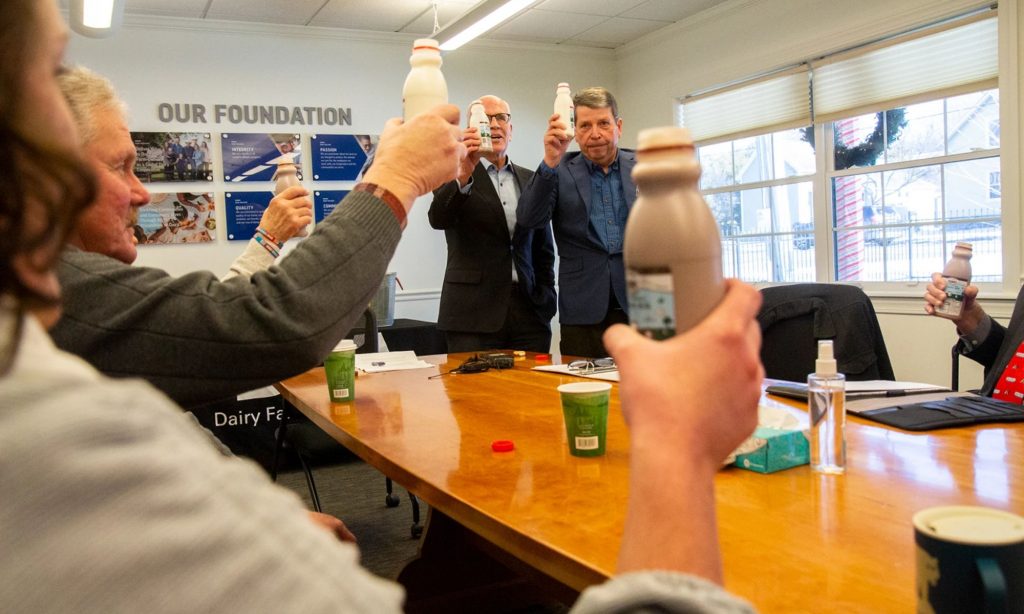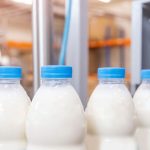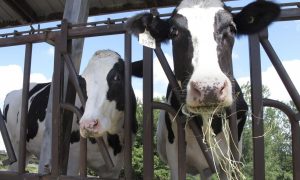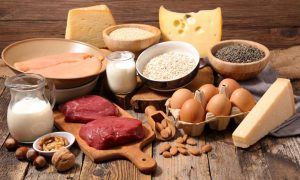
Among the farmers and stakeholders sitting at the table was Michael Thresher, who sits on the board of NOFA-Vermont. As organic dairy farmers face skyrocketing fuel, feed and fertilizer costs, he told Welch that if organic dairy farmers don’t get help soon, dozens could disappear over the next few months.
According to the latest state data, there are 153 organic dairy farms left in Vermont.
“One left last week, one’s in the process of leaving this week, as we speak. So we’re losing them as fast as we can talk about that right now,” Thresher said.
He noted a recent spending bill passed by Congress included language urging the U.S. Department of Agriculture to provide emergency relief.
“And that needs to be, you know, really, really in the forefront,” Thresher said. “Because here in Vermont, we’re looking at probably losing another 25 to 30 farms between now and spring, if we don’t something soon.”
He also asked that a safety net program be created specifically for organic dairy farmers, one like the Dairy Margin Coverage (DMC) Program that’s intended for conventional dairy farms. In exchange for farmers paying premiums, the federal program sends checks when the gap between milk pay-price and feed price falls below a certain level.
The current DMC program is authorized through the 2018 Farm Bill. Congress will take up a new farm bill in 2023, and Sheldon-based Green Mountain Dairy Farm’s Bill Rowell is hoping the DMC will get some updates, like increasing the milk volume cap on coverage.

“You’re entitled to up to 5 million pounds of milk to be insured at the $9.50 cent margin,” Rowell said to Welch. “That margin isn’t even available at any cost above the 5 million pounds. We produce 27 million pounds of milk a year.”
As Congress approaches the 2023 Farm Bill, Starksboro dairy farmer Jane Clifford said it’s important to remind people that helping farmers is synonymous with helping feed the country.
“We focus on on the farming aspect, but I think we really, it’s food and nutrition for the country,” Clifford said. “And instead of saying it’s just farm issues, it’s making sure that… this country is producing enough food to feed itself.”
Other suggestions from other roundtable participants Wednesday included:
- Adjusting federal disaster relief programs from county-by-county to acknowledging how microclimates impact farmers.
- Supporting more processing capacity for 8-ounce containers of milk to serve institutions like schools.
- Including the Northeast Dairy Business Innovation Center in the next Farm Bill so it can continue to serve the region.
- Make the Environmental Quality Incentive Program (EQIP) more robust to help farmers adopt climate mitigation practices.
- Improve workforce problems through housing and economic development programs.

Welch said this was his second official stop as the state’s newest U.S. senator following a visit in Rutland earlier in the week.
The Senate is still figuring out committee assignments for the new crop of lawmakers, and Welch didn’t specify whether he was interested in serving on the Senate Agriculture Committee. He did say he’s made his “interest in agriculture” known to Senate Majority Leader Chuck Schumer.
As a member of the U.S. House, Welch served on the dairy caucus, and he said he plans to carry on the legacy of his predecessor, former Sen. Patrick Leahy, and his commitment to Vermont agriculture and dairy.
“I love working with the Vermont farmers, all right,” Welch said. “There’s nothing better, no better people.”
After an hour-long discussion on Wednesday, Welch and Vermont’s Secretary of Agriculture Anson Tebbetts led the room in a toast to Vermont farmers, lifting their bottles of chocolate and regular milk.























